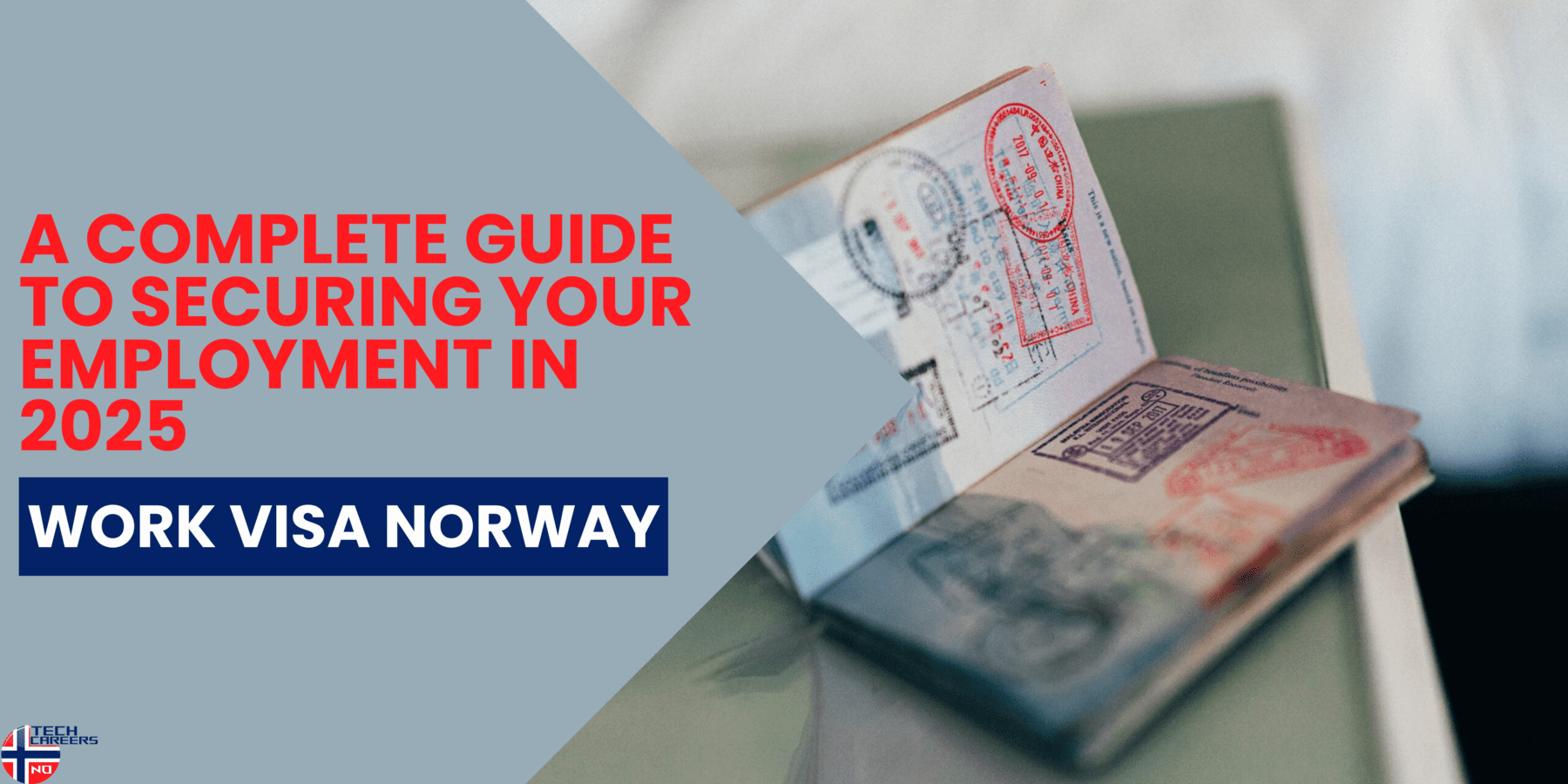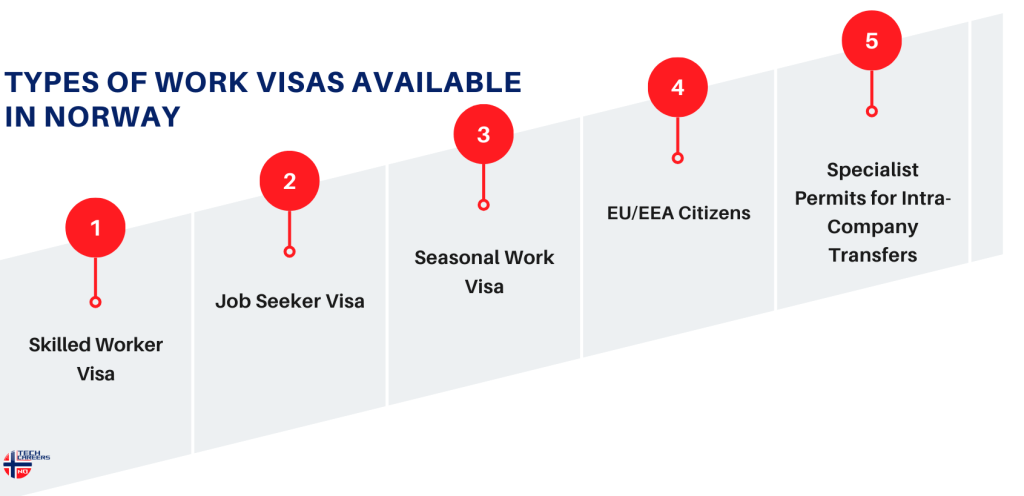
Securing a work visa in Norway is a crucial step for anyone looking to pursue employment opportunities, especially in high-demand sectors like IT jobs in Norway. The work visa not only legally authorizes you to work in the country but also provides you with essential rights and protections as a foreign employee. For IT professionals seeking to tap into Norway’s thriving tech market, understanding the importance of obtaining the correct work visa is essential.
Norway is known for its strong economy, excellent work-life balance, and progressive work culture, making it an attractive destination for professionals worldwide. However, to legally work in Norway, a valid work visa is mandatory for most non-EU/EEA citizens. Without it, gaining access to the competitive job market, particularly in sought-after fields like software development, data science, and IT support, becomes nearly impossible.
A work visa also provides security and peace of mind, ensuring that your employment is lawful and that you have the right to access Norway’s healthcare, social security, and other employee benefits. For IT jobs in Norway, having a work visa demonstrates to employers that you are a committed professional who is ready to integrate into the Norwegian workforce. It positions you as a serious candidate, enhancing your appeal to potential employers who prioritize compliance and stability.
Navigating the work visa Norway process can be complex, but it is a necessary investment in your future. Securing the right visa opens doors to high-paying IT jobs and offers a clear path to long-term residency or even citizenship in one of Europe’s most desirable countries.
Types of Work Visas Available in Norway
Understanding the different types of work visas available in Norway is important for anyone looking to secure employment, especially in specialized fields like IT. For professionals such as IT programmers, knowing which visa aligns with your qualifications and job prospects can streamline the application process and increase your chances of success. Here’s a breakdown of the main types of work visas available in Norway:
- Skilled Worker Visa
The Skilled Worker Visa is the most common pathway for professionals, including those in IT roles like programming, software development, and system architecture. This visa is designed for individuals who have specific skills or qualifications, often outlined in an IT programmer job description, such as proficiency in programming languages, software engineering, or database management. To be eligible, you must have a job offer from a Norwegian employer that matches your education and experience. This visa allows you to live and work in Norway for an initial period, typically up to three years, with the possibility ofan extension. - Job Seeker Visa
The Job Seeker Visa is ideal for those who wish to explore the Norwegian job market, particularly in high-demand sectors like IT, without securing employment beforehand. This visa allows you to stay in Norway for up to six months while you actively search for a job. It’s a great opportunity for IT professionals who have the right skills and want to network with potential employers in person. However, it’s important to secure a job offer and transition to a Skilled Worker Visa before the Job Seeker Visa expires. - Seasonal Work Visa
The Seasonal Work Visa is intended for short-term employment in industries like agriculture, tourism, and fishing, but it can occasionally apply to IT roles that require temporary project-based work. While it’s less common for IT programmers, some tech companies may hire professionals for short-term contracts under this visa. It’s important to note that this visa is not designed for long-term IT employment and does not provide a pathway to permanent residency. - EU/EEA Citizens
EU/EEA citizens have a distinct advantage when seeking IT jobs in Norway, as they do not need a work visa. They can live and work in Norway freely but must register with the Norwegian authorities if staying longer than three months. For EU/EEA citizens, crafting a strong IT programmer job description and presenting relevant skills can be more straightforward, given the simplified legal requirements. - Specialist Permits for Intra-Company Transfers
This permit is suitable for IT professionals being transferred within a multinational company to a branch or subsidiary in Norway. It allows skilled workers to continue their employment within the same organization but from a Norwegian base, making it ideal for programmers involved in global tech projects.
Each of these work visas has its own eligibility criteria, application process, and specific conditions. For IT professionals, especially those applying for roles detailed in an IT programmer job description, selecting the right visa type is a critical step in securing employment in Norway. Understanding these options will help you navigate the application process more effectively and align your career goals with the right legal framework.

Eligibility Criteria for a Norwegian Work Visa
Understanding the eligibility criteria for a Norwegian work visa is essential for anyone planning to work in the country. Norway has specific work visa requirements that must be met to ensure that applicants are qualified to fill roles in high-demand sectors like IT. Additionally, obtaining a Norway work visa sponsorship from a local employer can significantly strengthen your application, especially for specialized roles such as IT programming, software development, or technical support. Here’s a detailed look at the main eligibility criteria:
- Valid Job Offer from a Norwegian Employer
One of the primary requirements for a Norway work visa is securing a valid job offer from a Norwegian employer. The job must be full-time, and the role should match your qualifications and skills. For instance, if you are applying for a job as an IT programmer, the job description should clearly outline that your skills and expertise meet the role’s needs. Additionally, your potential employer must be willing to provide Norway work visa sponsorship, which involves confirming that no qualified candidates within the EU/EEA were available for the job. - Relevant Qualifications and Work Experience
Applicants must possess the necessary education, skills, and experience related to the job they are being offered. Typically, this means having a relevant degree or certification, such as a Bachelor’s in Computer Science or a related field, particularly for IT positions. Norway work visa requirements specify that your educational background and professional experience must directly relate to the job offer, which helps verify that you are suitably qualified for the role. - Proof of Sufficient Financial Means
Norway requires visa applicants to demonstrate that they have sufficient financial resources to support themselves while living in the country. This proof is usually covered by the job offer, which should meet or exceed the salary standards set by Norwegian authorities. However, it’s essential to ensure that your contract clearly outlines your pay, benefits, and working conditions, aligning with Norwegian labor regulations. - Health and Insurance Requirements
Applicants must have valid health insurance coverage, either through their employer or a private provider, that meets Norwegian standards. This is a crucial aspect of the Norway work visa requirements, ensuring that applicants can access healthcare services during their stay. - Clean Criminal Record
Norway emphasizes the importance of a clean criminal record for work visa applicants. You will need to provide a police clearance certificate from your home country or any other country where you have lived for an extended period. This is part of the broader effort to ensure that all individuals entering Norway under work visas meet the country’s safety and ethical standards. - Language Proficiency (Optional but Advantageous)
While not mandatory, proficiency in Norwegian can significantly boost your chances of securing a visa, especially if your job involves direct client interaction or management roles. Some employers might prefer or require a certain level of Norwegian proficiency, even if the primary working language is English. - Meeting Specific Job Requirements
For specialized roles like IT programming, your qualifications must align with the job description. Norway work visa requirements often include proving that you have the technical skills and competencies listed, such as experience with specific programming languages, software, or platforms that are mentioned in your job offer.

Meeting these eligibility criteria is essential for successfully obtaining a Norwegian work visa. By ensuring you fulfill the Norway work visa requirements and securing sponsorship from a Norwegian employer, you increase your chances of a smooth and successful visa application process, paving the way for a fulfilling career in one of Europe’s most dynamic job markets.
How to Get Work Visa in Norway
Securing a Norway work permit visa is a critical step for anyone planning to work in the country. The process can seem complex, but understanding the steps involved can make your application much smoother. Whether you’re pursuing a job in IT, engineering, or any other sector, following a structured approach is key to successfully obtaining your work visa. Here’s a step-by-step guide on how to get a work visa in Norway:
- Secure a Job Offer and Norway Work Permit Sponsorship
The first step in obtaining a Norway work permit visa is to secure a valid job offer from a Norwegian employer. Your employer must agree to sponsor your visa, confirming that the role could not be filled by a qualified candidate from within the EU/EEA. Ensure that the job offer includes a detailed job description, your expected salary, and working conditions that meet Norwegian standards.
- Gather Required Documentation
Once you have a job offer, start collecting the necessary documents for your application. The required documents typically include:
- A valid passport with at least six months remaining before expiration.
- A signed job offer or employment contract.
- Proof of your qualifications, such as diplomas, certificates, and work experience letters relevant to the role.
- Police clearance certificate (clean criminal record).
- Proof of financial means or salary information from your employment contract.
- Health insurance documentation if not covered by your employer.
- Submit Your Application Online or at a Norwegian Embassy
Applications for a Norway work permit visa can be submitted online through the Norwegian Directorate of Immigration (UDI) website or in person at a Norwegian embassy or consulate in your home country. If applying online, you will need to create a user account, fill out the application form, and upload the required documents.
- For those applying at an embassy, you will need to book an appointment in advance, bring all required documents, and pay the application fee.
- Pay the Visa Application Fee
There is a fee associated with applying for a Norway work permit visa, which must be paid when submitting your application. The fee varies depending on the type of work visa, but it generally covers the cost of processing your application.
- Attend an Interview (if required)
Depending on your nationality and the specifics of your application, you may be asked to attend an interview at a Norwegian embassy or consulate. The interview is usually straightforward and focuses on verifying your documents and confirming the details of your employment.
- Wait for Processing and Decision
The processing time for a Norway work permit visa can vary, but it typically ranges from a few weeks to several months. During this time, the immigration authorities will review your application, verify your documents, and make a decision based on your eligibility and compliance with Norway’s visa requirements.
- Receive Your Visa and Travel to Norway
Once your visa is approved, you will receive your Norway work permit visa, allowing you to travel to Norway and begin working. Ensure that you comply with any additional requirements, such as registering with local authorities or obtaining a residence permit if applicable.
- Register with Norwegian Authorities Upon Arrival
After arriving in Norway, you may need to register with the local police or immigration office, especially if you are staying for more than three months. This step confirms your status as a legal resident and worker in Norway and is a crucial part of the integration process.
Following these steps will help you navigate the process of obtaining a Norway work permit visa, ensuring that you meet all requirements and are prepared to start your new job in Norway. By carefully following each stage, you can achieve a smooth transition into your new role and life in Norway.
Start Your Journey to Work in Norway Today
By securing the right work visa and understanding the application process, you can access Norway’s growing job market, especially in high-demand fields like IT. Don’t miss the chance to advance your career in one of the most dynamic and progressive countries in Europe.


 Previous Post
Previous Post